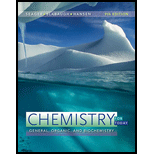
(a)
Interpretation:
The formula and the name for the compound that is composed of ion of the given metal and polyatomic ion are to be stated.
Concept introduction:
The compounds which are formed by mixing a metal ion with one polyatomic ion are known as polyatomic ionic compounds. The metal ion has the positive charge and polyatomic ion possess the negative charge in the polyatomic ionic compounds.
In the naming of polyatomic ionic compounds, firstly the name of the metal ion will be written and then the name of negatively charged polyatomic ion will be written.
(b)
Interpretation:
The formula and the name for the compound that is composed of ion of the given metal and polyatomic ion are to be stated.
Concept introduction:
The compounds which are formed by mixing a metal ion with one polyatomic ion are known as polyatomic ionic compounds. The metal ion has the positive charge and polyatomic ion possess the negative charge in the polyatomic ionic compounds.
In the naming of polyatomic ionic compounds, firstly the name of the metal ion will be written and then the name of negatively charged polyatomic ion will be written.
(c)
Interpretation:
The formula and the name for the compound that is composed of ion of the given metal and polyatomic ion are to be stated.
Concept introduction:
The compounds which are formed by mixing a metal ion with one polyatomic ion are known as polyatomic ionic compounds. The metal ion has the positive charge and polyatomic ion possess the negative charge in the polyatomic ionic compounds.
In the naming of polyatomic ionic compounds, firstly the name of the metal ion will be written and then the name of negatively charged polyatomic ion will be written.
(d)
Interpretation:
The formula and the name for the compound that is composed of ion of the given metal and polyatomic ion are to be stated.
Concept introduction:
The compounds which are formed by mixing a metal ion with one polyatomic ion are known as polyatomic ionic compounds. The metal ion has the positive charge and polyatomic ion possess the negative charge in the polyatomic ionic compounds.
In the naming of polyatomic ionic compounds, firstly the name of the metal ion will be written and then the name of negatively charged polyatomic ion will be written.
Trending nowThis is a popular solution!

Chapter 4 Solutions
Chemistry for Today: General, Organic, and Biochemistry
- Show work. Don't give Ai and copied solutionarrow_forwardNonearrow_forwardUnshared, or lone, electron pairs play an important role in determining the chemical and physical properties of organic compounds. Thus, it is important to know which atoms carry unshared pairs. Use the structural formulas below to determine the number of unshared pairs at each designated atom. Be sure your answers are consistent with the formal charges on the formulas. CH. H₂ fo H2 H The number of unshared pairs at atom a is The number of unshared pairs at atom b is The number of unshared pairs at atom c is HC HC HC CH The number of unshared pairs at atom a is The number of unshared pairs at atom b is The number of unshared pairs at atom c isarrow_forward
- Draw curved arrows for the following reaction step. Arrow-pushing Instructions CH3 CH3 H H-O-H +/ H3C-C+ H3C-C-0: CH3 CH3 Harrow_forward1:14 PM Fri 20 Dec 67% Grade 7 CBE 03/12/2024 (OOW_7D 2024-25 Ms Sunita Harikesh) Activity Hi, Nimish. When you submit this form, the owner will see your name and email address. Teams Assignments * Required Camera Calendar Files ... More Skill: Advanced or complex data representation or interpretation. Vidya lit a candle and covered it with a glass. The candle burned for some time and then went off. She wanted to check whether the length of the candle would affect the time for which it burns. She performed the experiment again after changing something. Which of these would be the correct experimental setup for her to use? * (1 Point) She wanted to check whether the length of the candle would affect the time for which it burns. She performed the experiment again after changing something. Which of these would be the correct experimental setup for her to use? A Longer candle; No glass C B Longer candle; Longer glass D D B Longer candle; Same glass Same candle; Longer glassarrow_forwardBriefly describe the compounds called carboranes.arrow_forward
 World of Chemistry, 3rd editionChemistryISBN:9781133109655Author:Steven S. Zumdahl, Susan L. Zumdahl, Donald J. DeCostePublisher:Brooks / Cole / Cengage Learning
World of Chemistry, 3rd editionChemistryISBN:9781133109655Author:Steven S. Zumdahl, Susan L. Zumdahl, Donald J. DeCostePublisher:Brooks / Cole / Cengage Learning Chemistry for Today: General, Organic, and Bioche...ChemistryISBN:9781305960060Author:Spencer L. Seager, Michael R. Slabaugh, Maren S. HansenPublisher:Cengage Learning
Chemistry for Today: General, Organic, and Bioche...ChemistryISBN:9781305960060Author:Spencer L. Seager, Michael R. Slabaugh, Maren S. HansenPublisher:Cengage Learning Introductory Chemistry: A FoundationChemistryISBN:9781337399425Author:Steven S. Zumdahl, Donald J. DeCostePublisher:Cengage Learning
Introductory Chemistry: A FoundationChemistryISBN:9781337399425Author:Steven S. Zumdahl, Donald J. DeCostePublisher:Cengage Learning Living By Chemistry: First Edition TextbookChemistryISBN:9781559539418Author:Angelica StacyPublisher:MAC HIGHER
Living By Chemistry: First Edition TextbookChemistryISBN:9781559539418Author:Angelica StacyPublisher:MAC HIGHER




